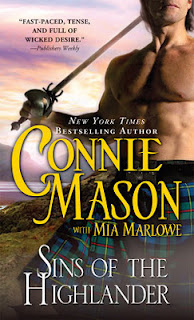Today I have the pleasure of welcoming author Mia Marlowe to talk to us about polishing your manuscript. For all of you doing NaNoWriMo, this checklist of things to look for after you've finished your draft is going to be especially indispensable.
And if that wasn't enough, Mia is giving away an ARC of SINS OF THE HIGHLANDER to a lucky commenter! (open internationally) So be sure to leave your email address in the comments.
Now, over to Mia...
The manuscript is finished. Now what? Time to revise andpolish. And let me encourage you to be brutal. This is your last chance to makethe story as good as it possibly can be before you start submitting it. Youonly get one chance to impress an agent or editor. Make it count.
 Start with the beginning. Does your opening sentence raise aquestion in the reader's mind, something to hook them into reading on? If not,work on it until it does.
Start with the beginning. Does your opening sentence raise aquestion in the reader's mind, something to hook them into reading on? If not,work on it until it does. I often tell my husband he married a hooker. No, this isn’t TrueConfessions! ;-) I'm talking about writing hooks. These are tiny tantalizingbits of information that create a path for your readers. If you work it right,you can literally pull your reader forward through your story. This is what keeps readers up nights.
I often tell my husband he married a hooker. No, this isn’t TrueConfessions! ;-) I'm talking about writing hooks. These are tiny tantalizingbits of information that create a path for your readers. If you work it right,you can literally pull your reader forward through your story. This is what keeps readers up nights. Look at your pages. How much white space is there? Are you tooheavy on narrative and too light on dialogue? Do you need the tags on yourdialogue or can you tell who's talking based on their speech patterns? Do allyour characters sound alike?
Look at your pages. How much white space is there? Are you tooheavy on narrative and too light on dialogue? Do you need the tags on yourdialogue or can you tell who's talking based on their speech patterns? Do allyour characters sound alike? When your story is polished till you're sick of it, turn it overto someone whose judgment you trust--generally not a relative or someone whowants to continue to sleep with you. Don't be defensive. Prepare yourself forrequests for revisions. If you don't develop the hide of a rhinoceros, yourstay in Writerland will be painful and brief. Accept their comments andconsider them carefully. You didn't come down the mountain with the storycarved in stone. Revise if you find you agree with them.
When your story is polished till you're sick of it, turn it overto someone whose judgment you trust--generally not a relative or someone whowants to continue to sleep with you. Don't be defensive. Prepare yourself forrequests for revisions. If you don't develop the hide of a rhinoceros, yourstay in Writerland will be painful and brief. Accept their comments andconsider them carefully. You didn't come down the mountain with the storycarved in stone. Revise if you find you agree with them.What special trick do you use tomake sure your final manuscript is the best version of the story of yourheart?
 Mia Marlowe writes historical romance for Kensingtonand Sourcebooks. A classically trained soprano, she calls her adventurous,sensual stories a cross between Grand Opera and Gilbert & Sullivan…withsex! Her Touch of a Thief(May 2011) received a rare starred review fromPublishers Weekly and January 2012 will see the release of her firstcollaborative novel with New York Times bestseller Connie Mason,Sins of theHighlander. Check out her blog at MiaMarlowe.com for RedPencil Thursday. Mia does an online critique of the first 500 words for anintrepid volunteer each week. She loves to connect with other writers andreaders and hopes you’ll join her on Facebookand Twitter.
Mia Marlowe writes historical romance for Kensingtonand Sourcebooks. A classically trained soprano, she calls her adventurous,sensual stories a cross between Grand Opera and Gilbert & Sullivan…withsex! Her Touch of a Thief(May 2011) received a rare starred review fromPublishers Weekly and January 2012 will see the release of her firstcollaborative novel with New York Times bestseller Connie Mason,Sins of theHighlander. Check out her blog at MiaMarlowe.com for RedPencil Thursday. Mia does an online critique of the first 500 words for anintrepid volunteer each week. She loves to connect with other writers andreaders and hopes you’ll join her on Facebookand Twitter.Remember to leave a comment and your email if you want to be entered to win the ARC!
Thanks, Mia, for stopping by!
All content copyright of the author. Please ask permission before re-printing or re-posting. Fair use quotations and links do no require prior consent of the author. ©Roni Loren 2009-2011 |Copyright Statement|
